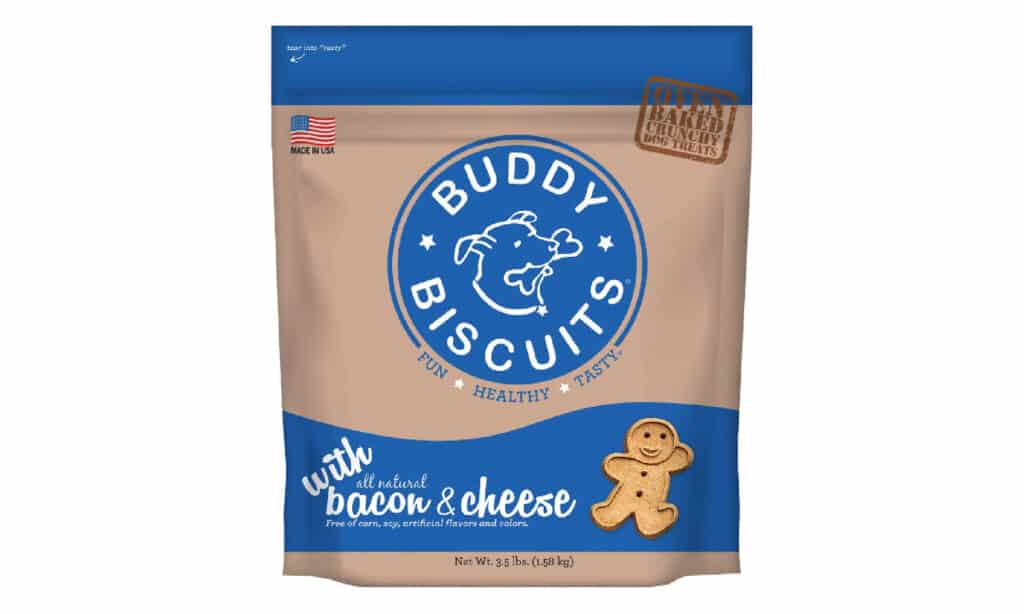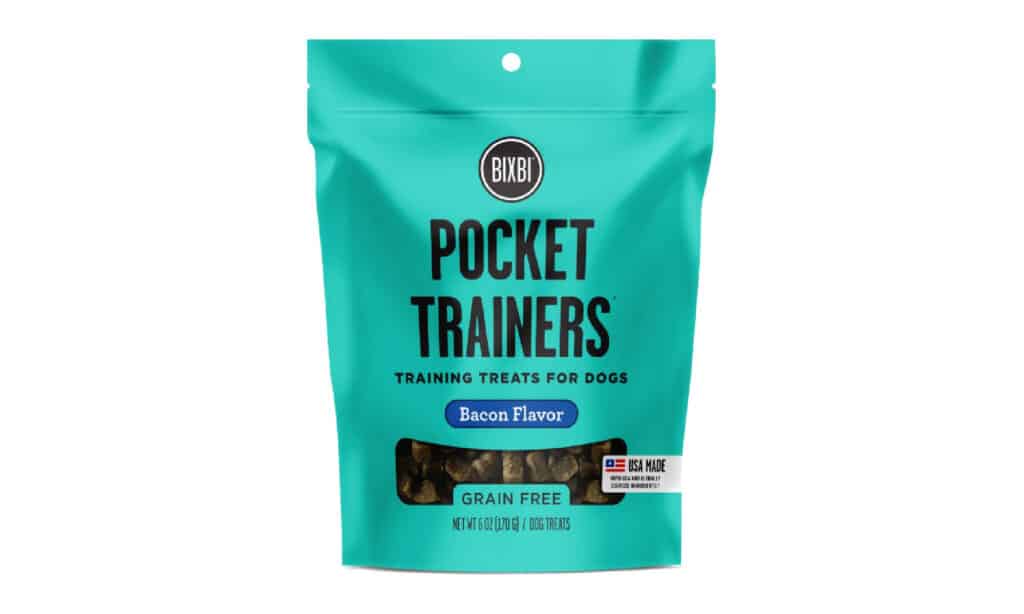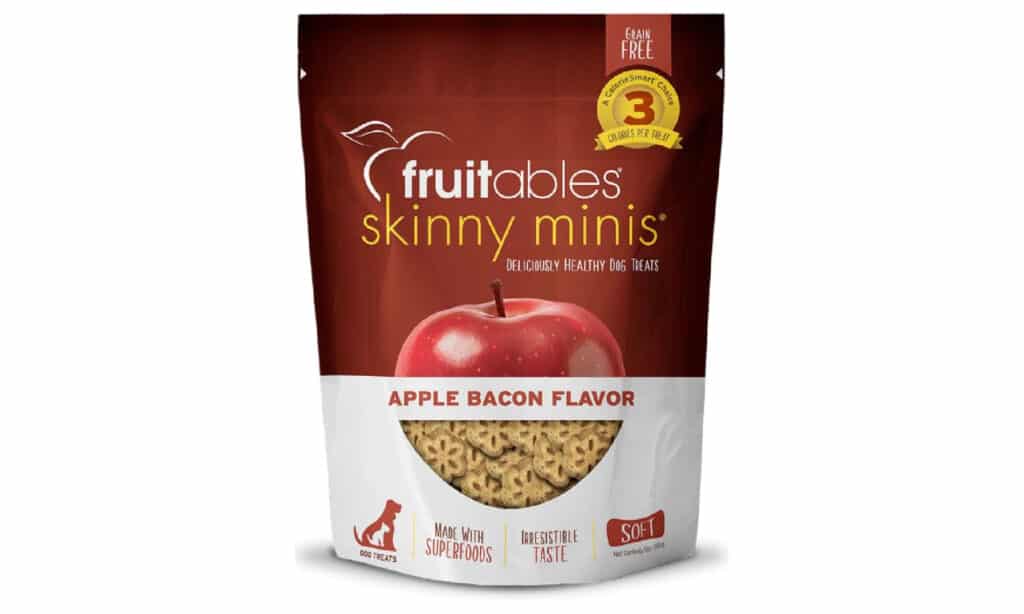Welcome to our blog post on a question that many dog owners have likely asked themselves at some point: Can dogs eat bacon bits? As dog owners, we all want to treat our furry friends with delicious snacks and tasty meals, but we also want to make sure that what we’re feeding them is safe and healthy.
Bacon bits are a popular topping for salads, baked potatoes, and other dishes, but is it okay to share them with our canine companions? “Learn about bacon bits for dogs: nutrition, safety, and potential risks to avoid
We’ll also provide some alternative treat ideas for your dog that are both tasty and nutritious. Curious about what your dog can safely eat? Read on!
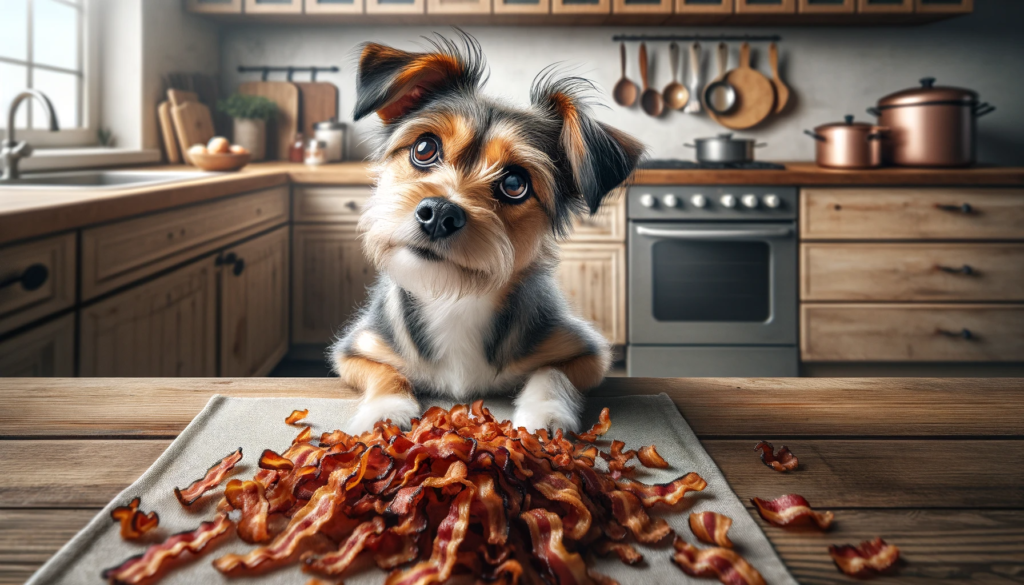
What are Bacon Bits:
Bacon bits are small pieces of bacon that have been chopped up into small, bite-sized pieces.Bacon bits top salads, potatoes, & dishes; sold in grocery stores as real/imitation.
Real bacon bits are made from cooked and crumbled bacon, while imitation bacon bits are typically made from textured vegetable protein or soy protein concentrate that has been flavored to taste like bacon.
Bacon bits add flavor and texture to dishes for those who love bacon but not its quantity. Consider if bacon bits are safe for dogs before giving them to your pet.
Can Dogs Eat Bacon Bits:
While bacon bits may be a tasty treat for humans, whether or not dogs can eat them safely is a more complicated question. The short answer is that dogs can technically eat bacon bits, but it’s not necessarily recommended.
One reason for this is that bacon is high in fat, which can be hard for dogs to digest and may lead to stomach upset or even pancreatitis if consumed in large amounts. Most store-bought bacon bits have harmful salt and preservatives for dogs.
Furthermore, imitation bacon bits may contain other ingredients that aren’t safe for dogs, such as onion or garlic powder. Some amounts of these ingredients are toxic to dogs and may cause anemia or digestive problems.
If you do want to give your dog a small taste of bacon, it’s best to stick with small amounts of cooked, unseasoned bacon rather than bacon bits. Bacon is an occasional treat, not a significant portion of a dog’s diet.
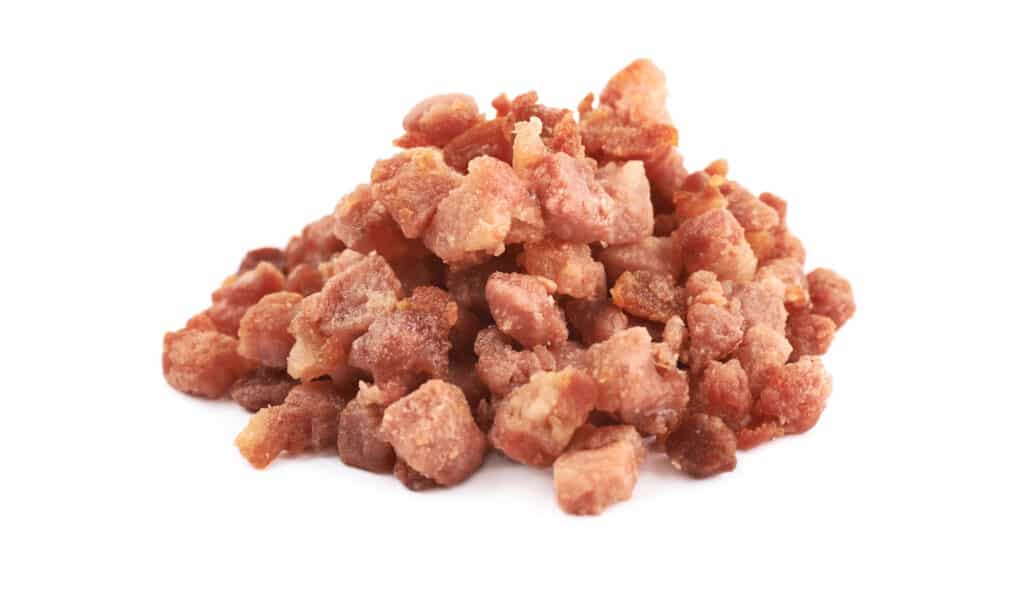
Harmful Ingredients in Bacon Bits:
While bacon bits may seem like a harmless treat, some of the ingredients found in them can actually be harmful to your dog’s health. Here are some examples of harmful ingredients that may be present in bacon bits:
- Salt: Excessive consumption of heavily salted bacon bits can lead to sodium poisoning in dogs. Symptoms of sodium poisoning in dogs include vomiting, diarrhea, tremors, seizures, and even death in severe cases.
- Preservatives: Bacon bits may harm your dog due to preservatives like sodium nitrite. These preservatives have been linked to an increased risk of cancer in humans and may have similar effects on dogs.
- Onion and garlic powder: Onion or garlic powder in bacon bits can be toxic to dogs in large amounts. These ingredients can cause anemia and digestive issues in dogs and should be avoided.
- Imitation bacon bits: Fake bacon bits can be hard for dogs to digest, causing stomach problems. They may also contain other harmful ingredients such as artificial flavors and colors.
In general, it’s best to avoid giving your dog bacon bits altogether and opt for healthier treat options instead.
Safe Ingredients in Bacon Bits:
While bacon bits may not be the healthiest snack option for your furry friend, there are some ingredients that are safe for dogs to eat in moderation. Here are a few examples of ingredients that may be found in bacon bits that are generally safe for dogs:
- Real bacon: For safe bacon bits, choose cooked, small pieces of real bacon. Bacon is high in fat, but small amounts of cooked bacon are safe for dogs.
- Natural flavors: Some bacon bits may contain natural flavors, which are generally safe for dogs in small amounts. However, it’s important to make sure that the natural flavors used don’t come from harmful ingredients like onion or garlic. Always check the label before giving any human food to your dog.
- Smoke flavoring: Smoke flavoring in bacon bits is safe for dogs if free of harmful additives or preservatives.
- Meat-based protein sources: Some bacon bits may be made with alternative meat-based protein sources like chicken or turkey. These can be a healthy and safe option for dogs, but make sure they aren’t heavily seasoned or processed.
Remember, it’s important to always check the label and be cautious when giving your dog any human food. Bacon should only be given as an occasional treat and should not make up a significant portion of your dog’s diet.
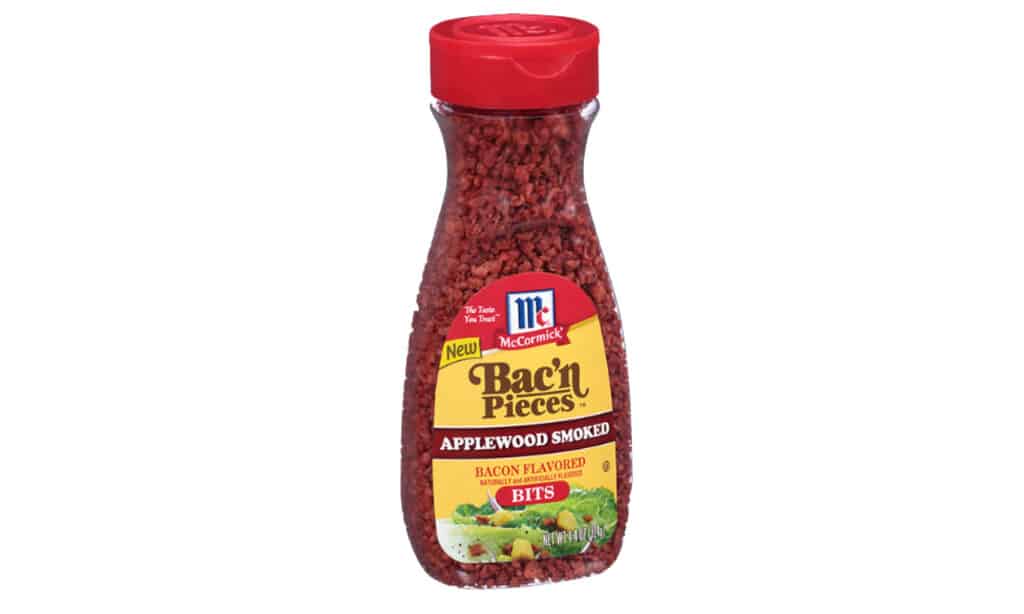
What Signs To Watch For If Your Dog Accidentally Ate A Lot of Bacon Bits?
Instead of feeding your furry friend bacon bits, opt for safe and healthy alternatives like lean proteins, fresh fruits and vegetables, and homemade dog treats. Cooked chicken, turkey, and lean beef are great sources of protein for dogs. You can also try feeding your dog fresh fruits and vegetables like apples, carrots, and green beans.
- Vomiting: Overindulging in bacon bits may cause vomiting in dogs. This can be a sign that your dog’s digestive system is struggling to process the bacon.
- Diarrhea: Eating too many bacon bits can also lead to diarrhea, which can cause dehydration and discomfort for your dog. Keep an eye on your dog’s poop and call the vet if diarrhea lasts over 24 hrs.
- Abdominal pain: Your dog may also experience abdominal pain or discomfort after consuming a large amount of bacon bits. This can manifest as lethargy, restlessness, or reluctance to move or be touched.
- Pancreatitis: Eating too many bacon bits can cause pancreatitis, which can be life-threatening. Symptoms of pancreatitis in dogs include vomiting, diarrhea, loss of appetite, abdominal pain, and lethargy.
If you notice any of these symptoms in your dog after they have consumed bacon bits, it’s important to contact your veterinarian right away. While small amounts of bacon may not cause any harm, excessive consumption can lead to serious health issues. It’s always better to err on the side of caution when it comes to your dog’s health and well-being.
If your dog has accidentally consumed a large amount of bacon bits, there are several signs to watch for that may indicate an issue. Here are some symptoms to keep an eye out for:
When or If You Should Go To The Vet?
If your dog has eaten a large amount of bacon bits, it’s important to monitor them closely for any signs of illness or discomfort. While small amounts of bacon bits may not cause any issues, excessive consumption can lead to serious health problems in dogs.
If you notice any symptoms such as vomiting, diarrhea, abdominal pain, or lethargy, it’s important to contact your veterinarian right away. These symptoms can indicate that your dog’s digestive system is struggling to process the excess food or that they may be experiencing more serious health issues like pancreatitis.
Your vet may recommend bringing your dog in for an examination and possibly some diagnostic tests like blood work or an abdominal x-ray to determine the extent of the problem. In some cases, your vet may recommend hospitalization or other treatments to manage your dog’s symptoms and prevent further complications.
It’s always better to be safe than sorry when it comes to your dog’s health, so if you’re ever unsure whether your dog’s bacon bit consumption warrants a trip to the vet, it’s always best to err on the side of caution and seek professional advice.
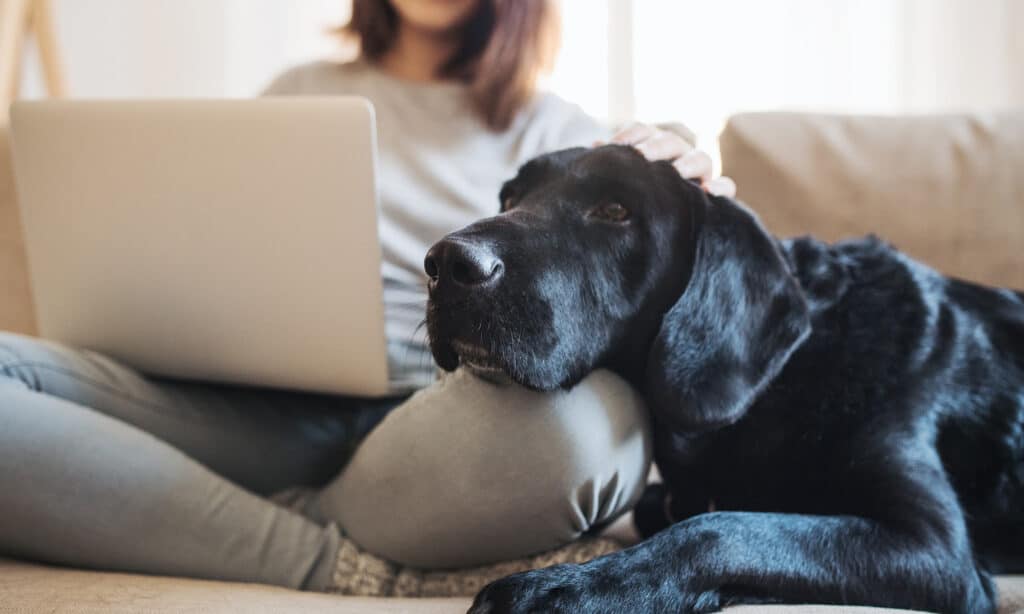
Safe Dog-Friendly Alternative to Bacon Bits:
If you’re on the hunt for some tasty and healthy alternatives to bacon bits for your furry companion, there are plenty of options to choose from! Here are a few ideas:
- Cooked lean meats: Instead of bacon, you can try giving your dog small pieces of cooked chicken or turkey. These meats are low in fat and high in protein, making them a nutritious treat option.
- Fresh fruits and vegetables: Dogs can safely eat many fruits and veggies, rich in vitamins and minerals. Apples, carrots, green beans, and blueberries are all examples of healthy snacks that your pup is sure to enjoy.
- Plain rice or pasta: Sometimes simple is best! Rice or pasta can give carb boost to dogs on diet. These foods are easy to digest and can provide your dog with a quick burst of energy.
- Peanut butter: Most dogs go wild for peanut butter, and it can be a healthy source of protein and fats. Just make sure to choose a brand that doesn’t contain any harmful ingredients like xylitol.
- Commercial dog treats: Many safe and healthy dog treats are available on the market. Look for options made with natural, high-quality ingredients and steer clear of any products that contain preservatives or additives.
Remember, it’s important to give your dog any human food in moderation and always check with your vet if you’re unsure whether a particular food is safe for your dog to eat. With a little creativity, you can find plenty of healthy treat options that your pup is sure to love!
Healthy Store-Bought Recommendations:
In conclusion, while it may be tempting to share your bacon bits with your furry friend, it’s important to remember that not all human foods are safe for dogs to eat. Choose healthier snack options for your dog instead of relying on bacon bits.
By keeping an eye on your dog’s diet and choosing snacks that are high in nutrients and low in harmful ingredients, you can ensure that your furry friend stays happy and healthy for years to come. Check with your vet before giving any questionable food to your dog.
Remember, your dog relies on you to make the best choices for their health and well-being. By choosing safe and healthy alternatives to bacon bits, you can show your pup how much you care and help them live their best life possible.
~ Lindsie

